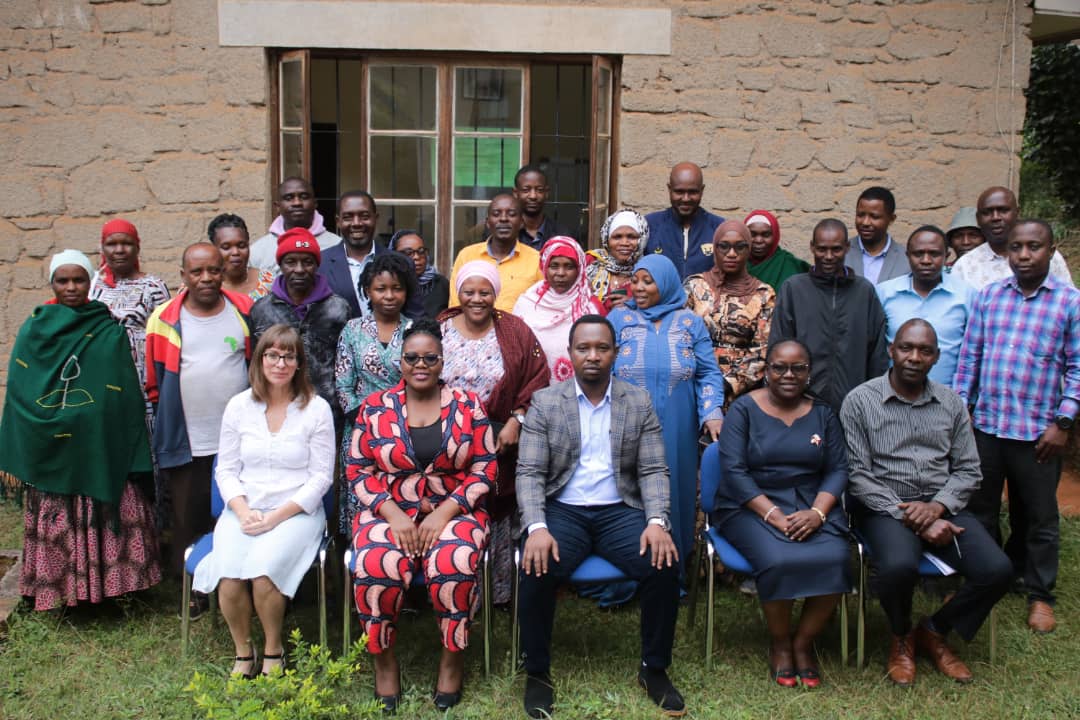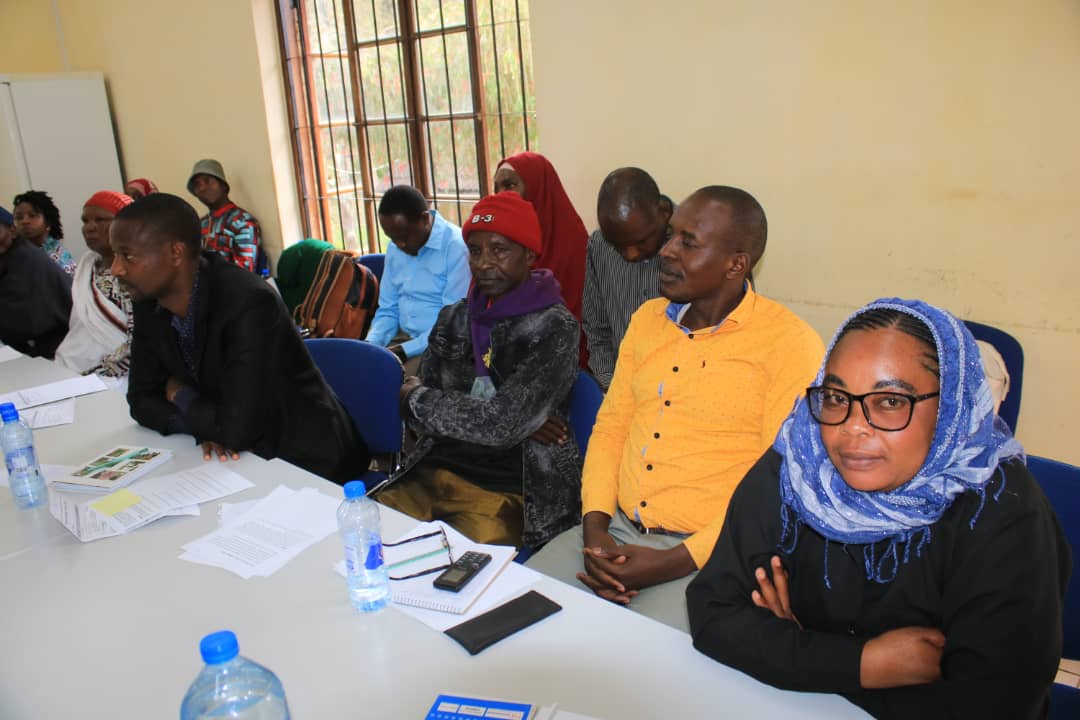AgriFoSe2030 Change Stories
Small-scale interventions ignite powerful shifts for Gender Transformation in Tanzania

Group photo from the GenSens project in Tanzania. Photo: GenSens project
‘I will champion the creation of awareness in my community about the importance of gender equality in society. Both men and women can benefit from eliminating gender discrimination.’
In Tanzania, women form the majority of agricultural labor, yet they face systemic barriers that hinder their productivity and decision-making capacity. Cultural norms, gender biases, limited literacy and inadequate access to gender-sensitive agricultural extension services have long hampered female farmers. AgriFoSe2030’s gender sensitive extension project (GenSenS) set out to address gendered imbalances in extension service access by adopting a transformative gender approach, utilizing creative, visual and participatory methodologies. The project utilized systematic approaches to ensure optimal results, namely establishing the scientific evidence base, stakeholder engagements, and eliciting action from stakeholders and decision makers.
Establishing the evidence base
An initial systematic literature review of the state-of-play regarding female smallholder engagement in agricultural extension highlighted how men are disproportionally favoured in extension service access while most female smallholder farmers in developing countries have limited extension service access and are less able to engage with, and to implement extension advice. The review identified a number of limiting factors including: a biased focus on men by agricultural extension services, a lack of female extension workers, and a failure to adapt extension advice and training moments to recognise the skills, needs and power of female farmers. Other barriers include women’s generally lower literacy and skill levels, time constraints, and limited ability to make independent decisions due to the intra-household dynamics and cultural norms that disempower women from decision-making on the farm or within agricultural marketing, despite their heavy involvement in farm labour. The review identified a major barrier to improving women’s access to extension service, being the low level of understanding among college tutors of what it means to consider gendered difference, why they matter for farm productivity improvements, and how to overcome gendered constraints.
The scientific evidence provided basis for developing project interventions to improve female farmer livelihoods in Tanzania via a more effective and gender-sensitive agricultural extension service delivery. The project focused primarily on building capacity for gender-sensitive extension of village-based agricultural advisors who study via the major vocational training college system. By transferring knowledge, capacity and gender-sensitive strategies for extension services to college tutors, the project empowers future cohorts of extensionists to be gender responsive and thus better enable female farmers overcome the constraints that too-often impair their agricultural practice. Major activities included two workshop sessions held in Ilonga agricultural training college and at Lushoto District, and ameeting at the ministry headquarters, Dodoma.
Planting seeds of change: Gender transformation in action
The project deployed powerful roleplaying, scenario discussions, behavioural change pledges and gender visualisation exercises to showcase the detrimental impacts of gender inequality. The novel methods provide striking insights and etches a graphic image of gender inequality in the minds of participants, hopefully fostering a better understanding of gender challenges. They are a departure from the dominant lecture and dialogue models that dominate gender training projects.
In Tanzania, Farmers – learned how and why gender gaps in skills, power and workload arise and how they contribute and how to make change that reduces the gap female farmers often experience. They also pledged to educate their family members, neighbours and the wider community about their improved understanding and emphasise the importance in also educating and supporting girls and ensuring the chore load at home is equal among boys and girls. One farmer shared that he would start by assigning household chores equally between his sons and daughters, as a tangible step towards promoting gender equality at home. They all claimed transformative learning, suggesting that their perspectives, understanding, and approaches to learning were profoundly altered.
‘I will educate my children on the importance of a gender-equal society, so they can narrow and eradicate the gender gap. Our mistakes should not be theirs; instead, they should serve as lessons for a better future.’
 One of the workshops within the GenSens project. Photo: GenSens project
One of the workshops within the GenSens project. Photo: GenSens project
‘I will empower my daughters and educate my sons on the need for and importance of eliminating negative attitudes and thoughts towards women's capabilities.’
Tutors realized the gap between gender theory and gender realities of agriculture production in real life. They also gained transformative understanding of gendered differences in society and how it starts with everyone and within the home. They gained key insights into why educating female and male students/farmers in exactly the same way, assuming the same level of skills and power may not always be the most appropriate strategy if the aim is to support female farmers. Extensionists were struck by the powerful realisation that they had been operating in a gender-blind manner and never really considered gender in how they reach out to farmers, nor design their interventions beyond statistics on numbers of male and female reached. They pledged to try to change how they operate as they go forward. Though further support is required in adopting new gender-sensitive ways of teaching and providing extension advise, the workshop challenged tutors and extensionists to begin this journey.
Policymakers at the Ministry of Agriculture embraced the project’s vision, recognizing it as the missing link in efforts to boost the productivity of female smallholder farmers and expressed a desire to scale the approach nationally, despite funding constraints.
Future work
Using visualisation, role plays and anchoring the scenarios to the local context resulted in a deep understanding, positive mindset change, and self-declared intended change. This initiative proved that small-scale interventions could ignite powerful shifts. By laying a foundation of understanding, the project contributed to planting the seeds for long-term change in Tanzania’s agricultural systems—unlocking the potential of female farmers and inspiring hope for a more equitable and productive future.
Although the project workshop attendees were few, we envisage a significant shift in worldview of project participants, critical reflection on their prior knowledge, and the adoption of new attitudes or practices. The consequent change in structures, farm practices, college training approaches and extension delivery will require further work in a new project. However, the intended change requires that protagonists really understand why gender matters and is relevant to consider within agricultural extension as a foundation. The AgriFoSe2030 GenSenS project could be a springboard for such future transformative work.

Johanna Wetterlind, Assoc. Professor
Challenge leader of AgriFoSe2030 Challenge 3
Department of Soil and Environment, SLU
Telephone: +46 (0) 511-671 12
E-mail: johanna.wetterlind@slu.se

Heather Mackay, Dr.
Assistant challenge leader of Challenge 4
Department of Human Geography, Lund University
E-mail: heather.mackay@keg.lu.se
 Selorm Kobla Kugbega, Dr
Selorm Kobla Kugbega, Dr
Communications lead AgriFoSe2030
SEI, Stockholm Environment Institue
Phone: +46 (0)73- 27 04 306
E-mail: selorm.kugbega@sei.org